‘Book Club’ celebrates second chances at love
“Book Club” (2018). Cast: Diane Keaton, Jane Fonda, Candice Bergen, Mary Steenburgen, Andy Garcia, Craig T. Nelson, Don Johnson, Richard Dreyfuss, Alicia Silverstone, Katie Aselton, Wallace Shawn, Ed Begley Jr., Mircea Monroe, Joey Stromberg, Sabrina Friedman-Seitz. Director: Bill Holderman. Screenplay: Bill Holderman and Erin Simms. Web site. Trailer.
As the years pass by, it can be easy to let our lives (and ourselves) slide. Those of us who have attained a certain age may unwittingly fall into the trap of believing that the best years are behind us, that the joys of our youth and young adulthood are no longer available or take too much effort to recapture. This is especially true when it comes to our love lives. But is that really the case? It might take a little initiative to get back what’s been lost, but it is indeed possible – and worth it – as a quartet of seniors discover for themselves in the new romantic comedy, “Book Club.”
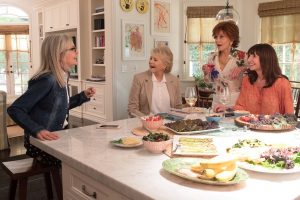
Longtime friends Diane (Diane Keaton, left), Sharon (Candice Bergen, second from left), Vivian (Jane Fonda, second from right) and Carol (Mary Steenburgen, right) get together every month to enjoy great works of literature, such as E.L. James’s Fifty Shades of Grey, in the new romantic comedy, “Book Club.” Photo courtesy of Paramount Pictures.
When four friends form a book club, who thought they’d still be meeting 40 years later? But so it is with Diane (Diane Keaton), Sharon (Candice Bergen), Carol (Mary Steenburgen) and Vivian (Jane Fonda). The vibrant, spry seniors are all going strong in their lives except in one very important area – the romance department. But, then, each of them has her own challenges:
- Diane was married for decades and became the proud mother of two (Alicia Silverstone, Katie Aselton). But, with the death of her husband a year ago, she now faces a somewhat uncertain future. Her overprotective daughters want her to relocate from her home in southern California to a retirement community near them in Arizona, but she has reservations about leaving her friends behind. And, even though she’s available again, dating is the last thing on her mind, especially with her kids meddling in seemingly every aspect of her life.
- Sharon was happily married (or so she thought) for many years. But, when her husband, Tom (Ed Begley Jr.), left her for a younger woman (Mircea Monroe), Sharon’s love life came to an abrupt halt. Even though she got divorced and felt nothing but animosity toward her ex, she couldn’t get past her anger and refused to move forward, a struggle that’s been going on for 20 years. She threw herself into her work as a federal judge and never gave romance a second thought.
- As the owner of a successful upscale restaurant, Carol loves her work. She also loves her husband, Bruce (Craig T. Nelson), who recently retired. With more free time to spend with one another, she had great hopes for reinvigorating their relationship. That expectation hasn’t panned out, however, as things have turned rather humdrum, especially in the bedroom. Carol drops more than her share of hints about spicing up their love life, but Bruce is either unaware or uninterested in her advances. What’s a frisky wife to do?
- Free-spirited Vivian has always been hard to pin down, especially where relationships are concerned. As a successful hotelier, she’s been far too focused on building her career and business to think about getting involved. She even turned down a proposal from an old flame, Arthur (Don Johnson). Her attitude didn’t keep her from having a robust sex life, but she never saw herself as the marrying type. However, now that she’s getting on in years, does she still want to be on her own, unhindered but nevertheless alone?
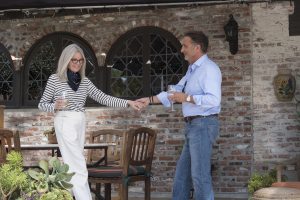
Diane (Diane Keaton, left), widowed after a long marriage, rediscovers the joys of dating when she meets a sexy pilot, Mitchell (Andy Garcia, right), in the new romantic comedy, “Book Club.” Photo courtesy of Paramount Pictures.
Realizing these predicaments, Vivian decides to do something about it. When it’s her turn to choose a book for the club to read, she decides to shake things up by selecting Fifty Shades of Grey by E.L. James. If that saucy tale of sexual escapades doesn’t get the girls stoked up once again, she reasons, nothing will.
When Vivian announces her selection at a club meeting, her cohorts resist the idea. Given the book’s tawdry reputation and the respectable menu of titles they’ve read over the years, the other club members can’t see themselves perusing the pages of something as pulpy as the steamy best-seller. But, after they begin reading, they become unexpectedly captivated. What’s more, they find themselves inspired, prompting them to begin acting on their impulses – and their hormones – to get funky once again:
- Through a chance meeting on a flight to visit her daughters, Diane befriends a sexy pilot, Mitchell (Andy Garcia). Before long, she gets to find out just how friendly the skies can be.
- After working up the nerve to try her hand at online dating, Sharon launches into an unexpectedly frisky relationship with a tax attorney, George (Richard Dreyfuss). In no time she’s banging things other than her gavel.
- With a little trial and error, Carol finds ways to perk up her husband. Her timing isn’t always the most opportune, but she gets results that get noticed (even if they’re noticed by the wrong parties).
- And, much to her surprise, Vivian find herself on the verge of getting serious about someone – Arthur, whom she runs into unexpectedly in the lobby of her hotel. Will she rediscover what she passed up years ago?

Successful hotelier Vivian (Jane Fonda, right) rekindles her romance with an old flame, Arthur (Don Johnson, left), in filmmaker Bill Holderman’s directorial debut, “Book Club.” Photo courtesy of Paramount Pictures.
So what accounts for this change? It comes down to a matter of beliefs, the stuff of which our reality is made, thanks to the conscious creation process, the means by which those metaphysical building blocks are transformed from intangible ideas into manifested conceptions. And, specifically, it’s the changes in the women’s beliefs that bring out their new realities. Several factors figure into this.
For starters, Diane, Sharon, Carol and Vivian all realize that they’re not stuck with their circumstances; they have the powers of choice and free will at their disposal, and, should they opt to make use of them, they can re-create their existences in any way they like. However, they have to take the first step to make that happen. This can come about in a variety of ways, but, as with most of us, they must first grow so dissatisfied with their realities that they desire something new to take their place. But, also like many of us, they need some kind of catalytic inspiration to get their visionary juices flowing, and that’s where E.L. James comes in.
To bring about the change they want, the women must address the specific beliefs that are keeping them locked in place. Essentially they need to move beyond whatever is inhibiting them. Some may seem them, kindly, as apprehensions; others may view them, somewhat less delicately, as excuses. But, no matter what anyone calls them, at their heart, the beliefs that are holding them back are fundamentally limitations, and it’s those limitations that must be overcome if they want something new in their lives.
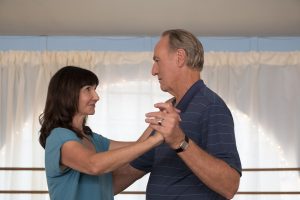
Restaurateur Carol (Mary Steenburgen, left) looks for ways to spice up her love life with her recently retired husband, Bruce (Craig T. Nelson, right), in the new romantic comedy, “Book Club.” Photo courtesy of Paramount Pictures.
Each of the women has her own limitations to get past, and addressing the specific self-imposed roadblocks they’ve set up for themselves is crucial to moving beyond them:
- Diane has more than her share of doubts – doubts about herself, her future, what she wants out of life and, most of all, a romantic life. If she can’t get past this, nothing will materialize, because our divine collaborator in the conscious creation process is unable to accommodate such conflicting intentions. After all, how can an entity capable of manifesting any wish do so if we doubt its ability to comply? It’s like saying “I want it, but I don’t believe you can give it to me” simultaneously.
- Sharon’s plagued by a combination of doubt and fear, a double whammy when it comes to undercutting the effectiveness of the conscious creation process. Since her marriage ended, she doubts that she’ll find happiness again, especially since she’s now unsure that she ever found it the first time around. This makes her reluctant, if not downright fearful, of trying again, because she doesn’t want to repeat what she sees as a mistake. However, if she also realizes what she’s learned from her first experience, she can move forward by putting beliefs into place that rule out those unfortunate possibilities from manifesting a second time.
- Even though Carol hopes for more fun-filled times now that Bruce is retired, on a deeper level, what’s really driving her motivations is a fear of losing the happiness she enjoys with her husband – if not the marriage itself. To compensate for that, she believes she needs to try extra hard to hold on to what she’s got. That may appear noble and committed, but it’s underpinned by a sense of desperation, a fear-driven attitude if there ever were one. This is a practice sometimes referred to as pushing the Universe, a practice where we try cajoling our divine collaborator into cooperation (or, more precisely, submission). Unfortunately, since fear is at the heart of this practice, it seldom works, bringing us distorted results, as Carol routinely finds out. To attain the outcome she wants, she needs to lose the fear and adopt beliefs aimed at bringing her what she wants without having to employ desperation in doing so.
- Fear is also at the heart of Vivian’s issues, specifically a fear of losing her sense of independence. She enjoys being her own person and is not anxious to compromise herself on this point, even if it means intentionally and steadfastly remaining single. But are independence and being partnered mutually exclusive? Perhaps it’s possible to embrace beliefs that accommodate both. In fact, maybe there are men out there who are attracted to women who are assertive, strong-willed and in charge of their destinies. Maybe Vivian should try implementing beliefs that embody such notions; she might be very pleasantly surprised by the results.
Themes like these have become quite common in movies these days, but they seem especially pertinent for this band of characters (and the demographic to which this movie appeals). As we age, unfortunately, we tend to grow less flexible in out outlooks, a perspective that can significantly inhibit our enjoyment of life and our prospects for the future. That’s important to bear in mind for seniors. They must ask themselves, “With the clock running out, how long are we going to wait?” In that light, then, this film offers those who are a little on in years a potent cautionary tale, especially for those who’ve lost their ambition or expectations of anything better coming along. By simply asking “Why not?” rather than perpetually defaulting to “Why should I?”, they may find some exceedingly pleasant surprises in store.
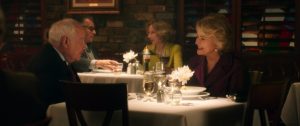
Divorcee Sharon (Candice Bergen, right) takes a chance on romance with George (Richard Dreyfuss, left) thanks to an online dating site in “Book Club.” Photo courtesy of Paramount Pictures.
In a world that worships youthfulness and all too readily shuttles the mature set out to pasture, it’s refreshing to see a story like this. It celebrates aging and demonstrates that it needn’t be looked upon as a time of life characterized by bland food, mahjong tournaments and lonely evenings in front of the TV with the volume turned up high. It truly can mean a fresh start, one full of vibrancy, engagement and maybe even a little naughty behavior. Indeed, this film shows that it’s never too late to have fun and enjoy life, no matter what ad agencies, social media and allegedly in-the-know trend influencers might say.
Put simply, “Book Club” is a real joy. What a treat it is to see a quartet of veteran performers doing what they do best and quite obviously enjoying themselves at it! This light, frothy, albeit somewhat predictable chick flick for the mature set clearly has its heart in the right place and hits the right notes most of the time. Granted, some of the jokes don’t land as solidly as they could, particularly in the first 30 minutes, and some of the humor is a little on the trite side. But, all things considered, this is still one fine diversion, full of fun, full of spirit and full of life, especially for those who can appreciate where its protagonists are coming from and are in need of a few good laughs.
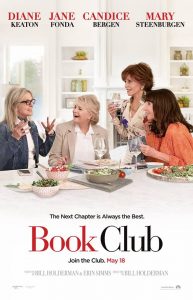
As the years pile up, it’s all too convenient – and perhaps even a little tempting – to grow complacent and settled, stuck in a rut of our own making. We can slip into it so casually that we might not even realize we’ve done so until we’re in the throes of it. But the examples in this film show what it means to come alive again, to rejoin those who enjoy life. And to think it can all start with something as simple as picking up a book – or watching a movie.
Copyright © 2018, by Brent Marchant. All rights reserved.




Leave A Comment